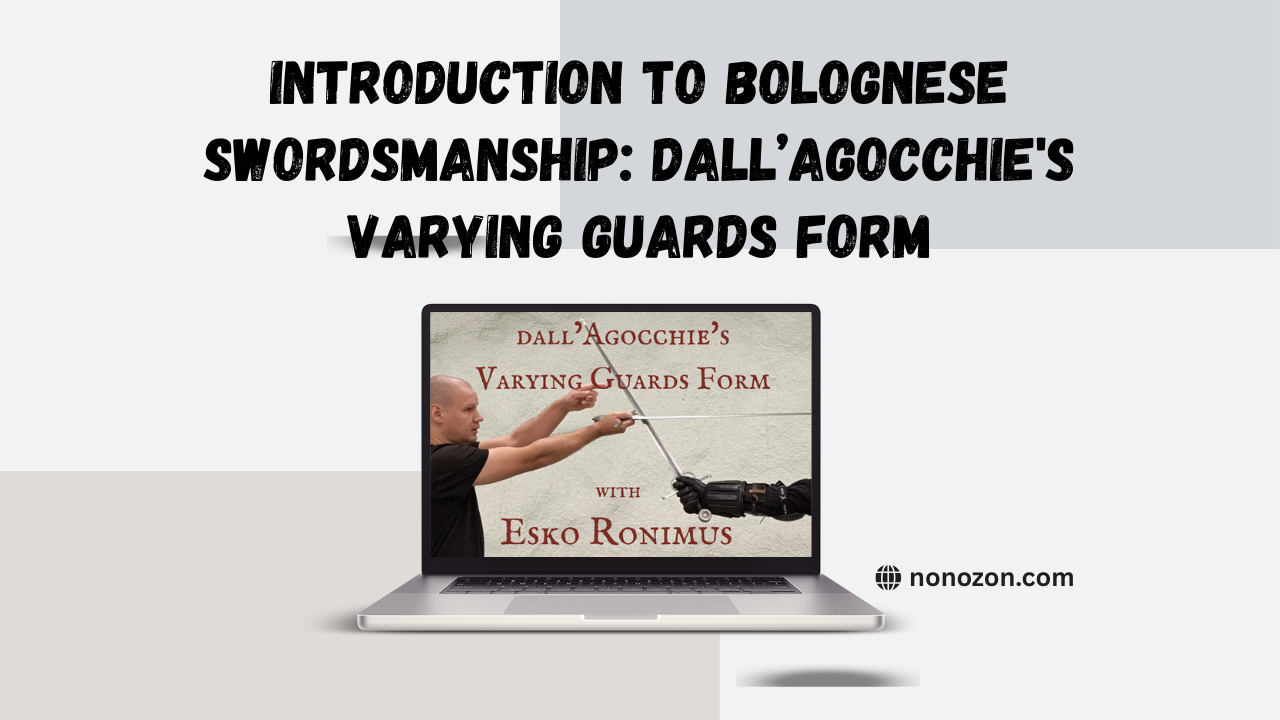Introduction to Bolognese Swordsmanship: dall’Agocchie's Varying Guards Form
by Esko Ronimus
Introduction to Bolognese Swordsmanship: Dall’Agocchie’s Varying Guards Form by Esko Ronimus
The intricate dance of skill, strategy, and tradition that is historical fencing has evolved into a wide variety of forms and styles all throughout the world. Among these techniques, Bolognese swordsmanship stands out, particularly as it is characterized by Giovanni Dall'Agocchie in his 1572 book. This martial art is thoroughly examined in the renowned Esko Ronimus's course "Introduction to Bolognese Swordsmanship: Dall’Agocchie’s Varying Guards Form," which is specifically tailored for students who are eager to acquire one-handed sword skills. This course offers more than just a collection of historical techniques; it offers a comprehensive guide to understanding the core concepts and real-world applications that define the Bolognese fencing legacy. Beyond basic physical skills, the core concepts taught in Esko Ronimus's training delve into the strategic thought required for effective combat. By focusing on carefully selected pieces from the various guards, the training allows students to explore the dynamic element of swordsmanship, which is crucial in real-world settings. Through planned workshops and engaging demonstrations, participants can expect to obtain a comprehensive understanding of both defense and offense—two crucial components of any successful fencing style. From the very first lesson, students are engrossed in the tactical subtleties that contribute to the uniqueness and effectiveness of the Bolognese style.
Comprehensive Overview of the Bolognese Sword Techniques
One of the main points of Ronimus's seminar on November 24, 2024, was the significance of using guards as the fundamental components of Bolognese fencing. For both novices and experienced practitioners navigating the intricate realm of historical fencing, the training places a strong emphasis on defense-counter maneuvers. Ronimus creates a rational and approachable learning environment by classifying plays according to whether they defend the inside or outside line. As a result, pupils not only pick up the moves but also comprehend the reasoning behind every choice made during a fencing match.
Key Concepts Influencing Bolognese Swordsmanship
- Guard Positions: Understanding the position of the guard is pivotal. The core guards in this style, derived from Dall’Agocchie’s writings, serve as more than just starting points; they are strategic stances that dictate both attack and defense.
- Defensive Techniques: Mastering defensive techniques like parries and counter-attacks can turn the tide of a duel. Ronimus emphasizes these techniques, ensuring students are well-versed in protecting themselves while effectively responding to threats.
- Offensive Strategies: Equally important as defense is the understanding of how to initiate an attack. This includes footwork, timing, and angling, which are all vital components of launching a successful strike while remaining adaptable.
- Dynamic Movement: The dynamic aspect of Bolognese fencing cannot be overstated. The ability to transition between guards fluidly enhances a fencer's effectiveness in a duel. Ronimus’s teachings encourage students to practice this dynamism, connecting various techniques seamlessly.
How the Course is Structured
The "Introduction to Bolognese Swordsmanship" course is meticulously structured to cater to participants of varying skill levels.
- Step-by-Step Learning: Because the instruction is structured, pupils are guaranteed to learn each lesson gradually, with an emphasis on comprehending the mechanics underlying each move and guard stance.
- Online Accessibility: The course's online format is a priceless tool for individuals who are unable to attend in person, enabling practitioners and enthusiasts worldwide to learn the ancient art of Bolognese swordsmanship.
- Practical Demonstrations: Every class that Ronimus teaches includes hands-on demonstrations. Students can physically and visually interact with the approaches through this hands-on approach, which promotes a deeper comprehension of the subject matter.
Overall, this structured approach not only aids in retention but also promotes a sense of community among students as they share their learning experiences.
Check Proof of Content here:
The Importance of Guards in Bolognese Swordsmanship
Understanding guard postures is essential to learning how to wield a Bolognese sword. Ronimus skillfully describes the different guards in the course material, explaining how each position has a distinct function in both offense and defense.
Fundamental Guard Positions
Guard Name | Purpose | Key Techniques |
Posta di Donna | Versatile guard for both offense and defense | Cuts, thrusts, and half-swording |
Posta Longa | Ideal for creating distance and setting up attacks | Powerful thrusts |
Posta Finestra | Defensive guard against high attacks | Parries and counters |
Posta Dente di Zenghi | Strong guard for low strikes and sweeps | Low cuts and sweeps |
It is more than just intellectual to comprehend these guards. During a fight, a fencer can use each guard as a tactical choice. Through Ronimus's instruction, students are able to absorb how each stance works, which gives them the confidence to choose the right guard in real-world fighting situations.
Application in Real-World Scenarios
The use of guards has significant ramifications in actual combat scenarios and goes beyond simple theory. Participants in sparring sessions gain the ability to modify their guard position in response to an opponent's movements. For instance, a fencer may move into the Posta Finestra when confronted with an aggressive opponent, allowing them to block an attack while preparing a counterattack. The fundamental skills of the course are reinforced by this real-world application, which guarantees that students understand the importance of flexibility in fencing.
Bridging Historical Techniques with Modern Practice
The capacity of the "Introduction to Bolognese Swordsmanship" to close the gap between traditional methods and contemporary practice is one of its main advantages. As martial arts lovers look for ways to connect with ancient traditions in a modern setting, this relevance becomes more and more significant.
Insights from Historical Context
Ronimus provides insights on the historical background of the techniques by frequently referencing Dall'Agocchie's teachings. This gives students a deeper level of comprehension and enables them to recognize how swordsmanship has changed throughout time and how it has been used. In addition to enhancing the training process, historical knowledge fosters respect for the martial art.
The Modern Practitioner’s Journey
It takes a careful balancing act for contemporary practitioners to comprehend and use methods taken from writings that date back hundreds of years. Traditional approaches must be followed, but one must also acknowledge the need for flexibility in uncertain situations. Ronimus fosters a mindset that is both innovative in practice and respectful of history by encouraging students to critically examine the methods they use.
The fact that Ronimus's training makes the Bolognese fencing style accessible shows that modern martial artists are becoming more interested in traditional methods. Students may now study these old disciplines from the comfort of their homes thanks to internet platforms, which makes for a genuinely educational experience.
Conclusion
In conclusion, "Introduction to Bolognese Swordsmanship: Dall’Agocchie’s Varying Guards Form" by Esko Ronimus is a crucial guide for martial artists and students who want to go deeper into the art of Bolognese fencing. A comprehensive education in the art is ensured by the course, which covers both the theoretical and practical facets of historical swordsmanship. Ronimus crafts a whole educational experience that is entertaining and educational, with a focus on guard positions, defense-counter strategies, and the blending of historical background with contemporary practices.
In the end, this course immerses pupils in the rich history of the Bolognese fencing tradition in addition to teaching them the fundamentals of swordplay. This course is an essential tool for anyone interested in learning one-handed swordsmanship, as it promises to develop proficiency, comprehension, and a deep appreciation for the art of fencing. Students who study Dall'Agocchie's teachings embark on a journey that introduces them to centuries of martial tradition and equips them with the skills necessary to not only defend themselves but also recognize the subtle beauty of traditional swordsmanship.





